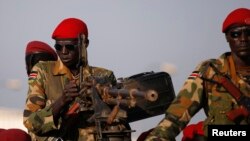The spokesman for South Sudan’s military says the army, with the constitutional responsibility to protect the country, has the right to arm itself.
This comes as reports say South Sudan has taken delivery of Chinese arms valued at $14.5 million.
Colonel Philip Aguer denies the acquisition of new weapons leaves an impression that Juba is not interested in a peaceful end to the seven-month long civil war.
Aguer says the arms were purchased in 2012 as part of a continuing effort to professionalize the army.
“The SPLA is the implementer of the security policy of the government of South Sudan, and South Sudan as a new nation, The army is undergoing a process of transformation which requires training, equipment and reorganization that it started since 2005 after the signing of the peace agreement between the north and the south,” he said.
“I don’t think that the equipment are the ones responsible for the violence," said Aguer. "The violence started after the rebellion of Riek Machar, who agitated some members of the army and the police. This rebellion has to be brought to an end through a political process.”
Talks in Ethiopia's capital, Addis Ababa, between rebels led by former Vice President and rebel leader Riek Machar and the government have been stalled. They were being brokered by the regional group Inter-Governmental Authority on Development (IGAD).
The U.N. Security Council said Wednesday it was ready to consider "appropriate measures" against the warring parties if they do not stop the violence and negotiate a transitional government.
The United States and the European Union have already imposed sanctions on some military leaders on both sides.
Col. Aguer blames the rebels for the stalled negotiations and fighting earlier this week in northern Bahr al Ghazal State, which is a breach of the cessation of hostilities agreement.
“Riek Machar is responsible," Aguer said. "He has stated that he’s not in control of some of his forces. This is apparent in Unity State where Major General Peter Gadet has disregarded the ceasefire, and openly said they are not implementing any agreement reached in Addis Ababa.”
The rebels boycotted the fourth round of talks in June in protest over what they said was an unfair selection process of the other stakeholders who they said were dominated by pro-government civil societies.






